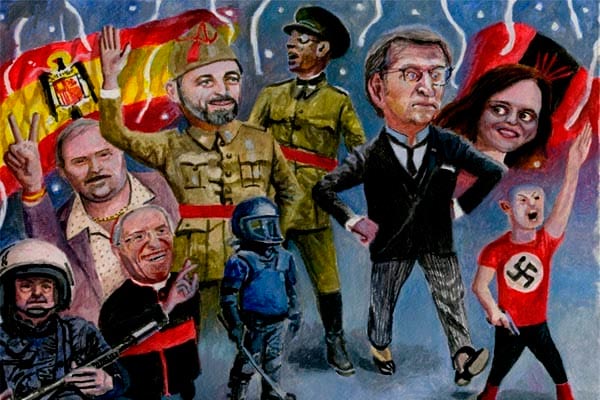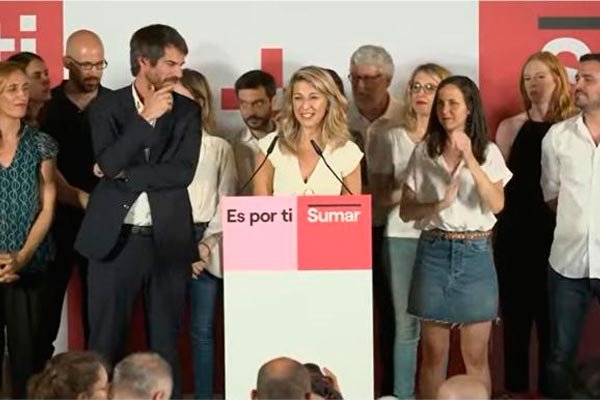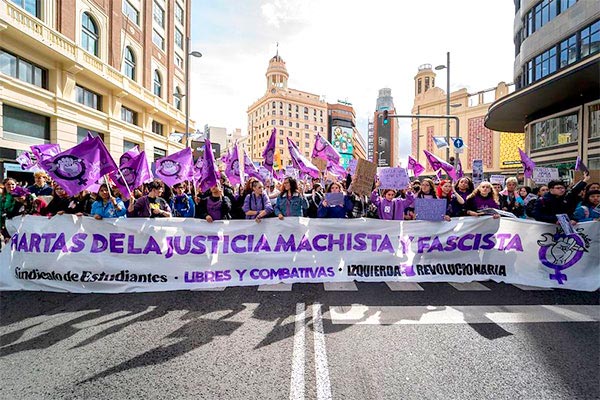The elections of 23J have resulted in a hard blow for reaction and for its social base, which was crying out for revenge against the left. The image of Abascal on election night, trying to avoid appearing before the media, and then sharing with his senior staff the image of complete demoralisation after babbling a string of accusations against Feijóo, sums up perfectly the defeat of these nationalist, chauvinist and xenophobic ultra-rightists. And the same can be said of the PP. Feijóo's speech to his supporters, disjointed in the face of the shouts in favour of Ayuso, was a pathetic exercise, even leaving his followers astonished when he said that he would try to form a government and that he would talk with PSOE and the rest of the parliamentary formations to achieve it. It can be seen that his sense of the ridiculous, which he had worked conscientiously during the electoral campaign, can be much more.
Despite the fact that almost all the polls predicted an absolute majority victory for reaction, and that this was the atmosphere that was in the air after the blue tsunami of 28M and the debacle of the governmental left, in the end It has been a turnaround.
The bloody blow to the extreme right of the PP and its fascist allies, which will prevent them from forming a government, is the consequence of the mobilisation of millions of workers and young people, of their determination to prevent a major regression in democratic rights and also a warning that this governmental left either rectifies, or it can face the abyss in the future.
What a lesson has been given by millions of workers and a youth that has been at the forefront of the mass demonstrations of militant feminism, against homophobic aggressions or the destruction of the planet. The youth have been key to these results, as have the people and workers of Catalonia and Euskal Herria, who have once again built a wall of resistance against the most nauseating Spanish nationalism.
Not to see this essential aspect, the anti-fascist consciousness of the labour movement and the youth in action, is to deny the enormous potential that exists to transform society along socialist lines. The sectarian formations that on their websites called for abstention already have a concrete verdict to their position: millions have clearly told them that this is not the way, that this way would lead to open the way to the ultra-right. What a lesson from the living movement of our class, and what ignorance on the part of those who drag the ideas of Marx, Lenin, Rosa Luxemburg and Trotsky through the mud.
A vote for the PSOE and SUMAR is not a blank check. It is quite the opposite. The vote has been an instrument to ward off the threat of reaction. But the discontent and frustration with the capitalist policies of the coalition government has not dissipated. And if the next government to be formed, which may obviously be led by Pedro Sánchez, insists on lining the pockets of the Ibex 35 and the banks, on doing nothing about the housing problem, on agreeing to cuts in health and public education, on maintaining repressive laws that are used against those who struggle, on a rickety social shield that does not prevent the advance of poverty, or on guaranteeing social peace to the bosses and imposing demobilisation; if it continues along this path, then the extreme right will regain momentum and can conquer its objectives.

Reaction, neo-fascism, has suffered a hard blow, but to think that it has been defeated and no longer poses any threat, bearing in mind what the regime of 78 means, is not only naïve, it is criminally stupid.
PP and Vox: from a triumphal walk to a nightmare night
The data must be analysed rigorously, without hiding any side of reality.
Despite the fact that it has finally been possible to prevent PP and Vox from joining forces to form a government, and that the increase in turnout has risen from 66.23% to 70.40% (4.17 points), the distance between the blocs has narrowed, and PP and Vox have come very close, just 5 seats away! from achieving an absolute majority.
The right-wing bloc has grown by 723,933 votes (2.18%), reaching 45.65% (11,177,348 votes) compared to the 43.47% it achieved in 2019 (10,453,415 votes). The parliamentary left bloc, including the pro-independence left, has lost 191,434 votes (1.68%) going from 49.96% (12,013,776 votes) to 48.28% (11,822,342 votes), but still beating the Spanish nationalist right by 644,994 votes. A majority of workers and young people understood perfectly well the threat posed by a victory of reaction, and they mobilised forcefully.
This fact, which cannot be appealed, is a response to all those who, from the institutional left and their media voices, charged against the workers and young people for their lack of conscience after the defeat of 28M. They blamed them for those results, without accepting the malaise and the more than justified criticism of a coalition government that has not stopped the impoverishment of the working class and that has accepted the logic of capitalism without complaining.
A criticism which, of course, is still valid, but which is combined with a very vivid historical memory that knows perfectly well what fascism is and the real threat it implies. And this attitude is what numerous leftist groupings have been unable to understand, calling impotently for abstention or null vote, and placing themselves in an equidistant position in a battle that the working class has understood was not secondary.
Our position was clear, as we pointed out in our last statement, maintaining an uncompromising Marxist position: "To say that it makes no difference who votes and who governs, that all are equal, that abstention is better, is to fall into a sectarian and impotent position. We revolutionaries have never been indifferent to the advance of the right, and we will not facilitate it on any terrain, not even at the ballot box. And voting critically or very critically for the formations of the parliamentary left does not mean legitimising their programme, nor their policies. It means using that vote to beat the fascists and, of course, relying only on the forces of the workers' movement and the youth, on their capacity to organise and fight to defeat neo-fascism with a socialist and anti-capitalist programme".
The right extreme and the extreme right expected a real triumphal walk, despising the capacity of struggle and resistance of the workers' movement and the militant youth. As a result, emboldened by the results of 28M, they launched an all-out offensive against feminism and the rights of women and the LGTBI community, against independence, and against the militant left and social movements.
A campaign that has not hesitated to count on the fascist phalanxes, through companies run by Nazis like Desokup. This was accompanied by the pacts between the PP and Vox in many communities and city councils, putting reactionaries of all kinds at the head of parliaments and governments, from condemned abusers to fascist bullfighters, and from misogynists of Opus Dei who attack women for lacking a penis to Falangists who vindicate massacres such as that of Badajoz in the civil war. All that social dust of reaction, made up of thousands of small and medium-sized businessmen who enrich themselves at the cost of the most savage and racist labour exploitation, and who vindicate the essences of Franco's dictatorship and national Catholicism, raised their heads in the hope of crushing us. They have not succeeded!

His arrogance and patriotic pride have hit against reality. Although the PP has won the elections, its results have fallen far short of expectations. The PP obtained 33.05% of the votes (8,091,840) compared to 20.99% in 2019 (5,047,040), an increase of 12 points, 3,044,800 votes, and 47 seats. On the other hand, Vox suffers the biggest setback, losing more than 17% of its votes (623,235), and falls from 15.21% to 12.39%, losing no more and no less than 19 seats, almost half.
In addition to the votes of Vox and those lost by Ciudadanos (1,650,318), the PP managed to win another 723,933 votes, both from abstention and probably, to a small extent, from very backward sectors of the socialist electorate.
The brazenness with which the right-wing has acted in recent weeks raised all the alarms and finally prompted this turnaround. Firstly, with an erratic Feijóo who, faced with the allegations of his links with the drug trafficker Marcial Dorado, went from saying that he knew nothing about his activities to saying that when he met him he was only a smuggler, not a drug trafficker, or absenting himself from a debate where Abascal ended up making a complete fool of himself.
For their part, Abascal and Vox emerged with their most fascist discourse, especially against Catalonia, Euskal Herria and independence. And in this, the PP reached out to them, bringing up ETA everywhere and popularising among its social base the "let Txapote vote for you". They were so convinced of their victory.
But this strategy has finally backfired, helping to mobilise the left, especially in the historic nationalities, and burying any possibility of a reactionary government. In Catalonia, the Spanish right went from 749,289 votes (19.46%) to 742,140 (21.10%) and won only 8 seats, the PP 6 and Vox 2. In the case of the Basque Country, they rose from 12.49% of the vote (147,004) to 14.10% (161,732), but only the PP won seats: 2 in the BAC and 1 in Nafarroa. The national question is once again a key issue in the defeat of a possible government of the extreme right.
The data on the left
In the case of the governmental left, the big winner is the PSOE, which has grouped together the useful vote.
Pedro Sánchez increased his support by almost a million votes, from 6,792,199 (28.25%) to 7,760,970 (31.70%) and won two more seats. Sumar and Yolanda Díaz did suffer a significant drop with respect to Unidas Podemos, but considerably less than expected given the PSOE's results: they lost 687,664 votes and 7 seats to UP and Más País, going from 3,701,670 votes (15.39%) to 3,014,006 (12.31%). But the government bloc, PSOE and Sumar, it even managed to increase its results, obtaining 281,107 more votes than in 2019, and going from 43.64% (10,493,869) to 44.01% of the votes (10,774,976).
It is clear that the youth played a decisive role in this mobilisation of the vote. A youth that has been at the head of the feminist movement and of the struggle for the rights of the LGTBI community; that has expressed itself massively on the streets in a context in which other fronts of the class struggle such as the trade union struggle have been blocked by the role of the bureaucracy of the CCOO and UGT and their disastrous policy of social peace and pacts with the CEOE.
The threat of the PP and Vox against democratic rights, women and the LGTBI collective, with their furious campaign against the Solo Sí es Sí Law or the Trans Law, with their denial of violence against women, or with their direct censorship of films and plays, have played a major role in mobilising the votes of tens of thousands of young people who were not willing to go back 50 or 60 years and lose fundamental democratic rights. Undoubtedly, another reflection of the importance of mobilisation and struggle in the streets that has been translated into the electoral arena.
The other central aspect has been the Spanish offensive against Catalonia and Euskal Herria. Vox has openly stated that if they reach the Government the savage repression of 2017, and the application of 155, would be a joke, and they have defended the illegalisation of EH Bildu, the CUP, ERC or the ANC. A provocation that has meant a revulsive for the mobilisation of the vote in Catalonia, key to the victory of the left, and where abstention increased by 10 points on 28M.
In Catalonia, the PSC obtained 34.49% of the votes (1,213,006) compared to 20.64% in 2019 (794,666): 418,340 votes and 7 more seats. A victory that has been decisive and that means that 1 in 8 socialist voters are from Barcelona, where the PSC in working-class neighbourhoods such as Nou Barris has managed to get 43.5% of the votes. In total, 15.6% of socialist voters are Catalan, the highest figure since 1996, which confirms the decisive weight of Catalonia in the electoral turnaround. On the other hand, Sumar resists, although it loses 97,451 votes, going from 15.36% (590,999) to 14.03% (493,548), but keeping its 7 seats.

It is clear that in the face of the stagnation and complete abandonment of the struggle for national liberation, for self-determination and the Republic, sectors of left-wing independentism have given priority in these elections to the useful vote to stop the extreme right and reaction: ERC falls back by 411,976 votes, from 22.73% (874,859) to 13.16% (462,883), losing half of its deputies; and the CUP loses 148,177 votes going from 6.42% (246,971) to 2.80% (98,794), being left out of Congress.
As for the Catalan right-wing party, Junts, led by Puigdemont and on which the investiture now depends, it also suffered a severe setback: 137,591 fewer votes, dropping from 13.77% (530,225) to 11.16% (392,634).
The comfortable victory of the left in Catalonia has been key to prevent an absolute majority of the reaction in the rest of the state: including ERC and the CUP, it obtained 64.48% of the votes compared to 65.15% in 2019.
The same can be said in the Basque Country, where the left obtained 60.29% of the votes, compared to 54.33% in 2019. This result is the result of the rise of the PSOE, 62,430 more votes to 25.27% (289,826), and the very important rise of EH Bildu, which increased its votes by 53,603 to 23.95% (274,676), surpassing the PNV in seats.
On the other hand, in communities where the right had advanced strongly, such as Madrid or Andalusia, the left resisted and even advanced thanks to a powerful mobilisation in the working class neighbourhoods. In the case of Madrid, with a turnout 5 points higher than in the 28M regional elections, the right loses 16,049 votes (the PP loses 251,354 votes and Vox gains 235,305) compared to 28M, while the left grows by 309,332 votes (the PSOE gains 375,574 votes while Sumar loses 70,242). These results give a resounding victory to the left in the working class districts of Madrid, from 51% and 54% in Carabanchel and Villa de Vallecas to 57% in Villaverde and Usera and 64% in Puente de Vallecas.
And the same can be said about Andalusia, where the PP maintains its results compared to the regional elections a year ago, but with the disappearance of Ciudadanos and the fall of Vox, the right wing overall loses reach almost 300,000 votes. At the same time, the PSOE obtained 570,939 more votes, and Sumar increased another 76,913 compared to the coalition Por Andalucía (IU-UP and Mas País) and Adelante Andalucía together, with a turnout that has increased by almost 13 points. In other words, the left has increased by a total of 647,852 votes compared to the regional elections of a year ago.
Building a revolutionary left and return to the struggle in the streets
That we have temporarily stopped this bunch of reactionaries is undoubtedly great news. These results give confidence to the working class, the youth and thousands of militant activists of the left in their own strength to fight the battle against the extreme right, against the bosses and against capitalism.
However, as we said at the beginning of this statement, it is necessary to make a serious analysis of how we got here, and why reaction has come so close to conquering La Moncloa.
As we have already pointed out, there is great dissatisfaction with the coalition government. Its supposed achievements, to which they have not ceased to appeal throughout the campaign, are a real mirage for millions of working class families. This is evident from the figures.
Poverty has not stopped increasing, as Oxfam and Caritas reports show; wages, including the SMI, have lost a lot of purchasing power in the face of the unbridled rise in inflation and especially in food prices; the IMV has been a complete failiure; the labour reform is defended by the PP and the employers, showing that it has been nothing more than a cosmetic fix maintaining a situation of labour precariousness that has become chronic; the Gag Law is still in force and actively applied against the youth and in workers' conflicts like the one in Cadiz or the metal workers strike in Pontevedra; and the public services, not only in Madrid but also in other communities or at the state level, continue to collapse and privatisations are not being reversed.
The coalition government has unabashedly supported US imperialism, NATO and Zelenski in the war in Ukraine, raising military spending to record levels; it has abandoned the Sahrawi people, and has covered up and justified infamous massacres such as the one in Melilla. And its policies, incapable of reversing the enormous difficulties of the working class, have guaranteed, and in what a way, the profits of the Ibex 35 and the bosses.
This enormous dissatisfaction, unease and disappointment have not gone away. The new coalition government will have an even more difficult situation than the previous one, as its parliamentary margin has narrowed even further. Obviously, if it continues with the same policies as before, unrest among its social base will grow, and sooner or later it will give reactionary forces a chance to reach La Moncloa. The threat has been averted this time, but reaction has not been defeated.
Sumar has formed a coalition, burying Podemos and everything it stood for, and that is how it looks set to be after these elections. Despite Pablo Iglesias' comments that Podemos will assert itself, the reality is that they have been reduced to 5 deputies compared to the 23 they had. Sumar is not going to be Podemos, and its completely uncritical collaboration with the PSOE will contribute to further deepening a drift that has progressively opened the doors to the extreme right and to reaction.
That is why, if we want to avert this increasingly serious danger, the danger of fascism, we cannot be satisfied with these results, nor with government action incapable of questioning the interests of the big capitalist monopolies, incapable of confronting a state apparatus at the service of the Francoist ultra-right, and incapable of promoting policies which genuinely resolve the enormous problems suffered by millions of working-class families.

The constitution of the new government will not be without obstacles. This is what we are already seeing from sectors of the state apparatus, furious with the defeat of the right, and which have already set themselves in motion by activating the arrest warrant against Puigdemont and Comin, and arresting Clara Ponsati in Barcelona, in an attempt to blow up a possible investiture of Pedro Sánchez. On the other hand, the media squadron is still on an hysterical offensive, hoping for some miracle that will allow new elections. But this possibility is very remote. Both Junts and ERC have a lot at stake. Their only alternative is an Executive of Pedro Sánchez or the blackest reaction, especially in a context of the ebb of the pro-independence movement in Catalonia as a result of its policies of collaboration with the '78 regime' and in defence of capitalism.
For revolutionary Marxists the central issue is to prepare for the tough period of class struggle that lies ahead. We need to take back the streets. Social peace as a cover for the capitalist policies of the coalition government has only served to strengthen the right wing. For this very reason, after these election results, it is not the time to go home and get complacent. On the contrary! We have to organise ourselves and raise a banner of struggle against fascism, the capitalism that breeds it and for socialism.
The capitalist system condemns us to misery, precariousness, loss of rights, totalitarianism, climate catastrophe and imperialist wars... We need to build a consistent revolutionary left, which does not argue with the right wing and the state apparatus but fights them; which does not try to convince the capitalists but confronts and expropriates them; which does not renounce the transformation of society but fights for socialism.
Join the Revolutionary Left. Not truce against capitalist policies and fascism.





















































